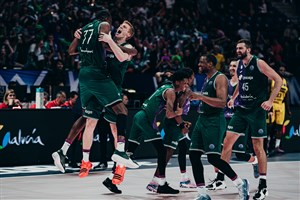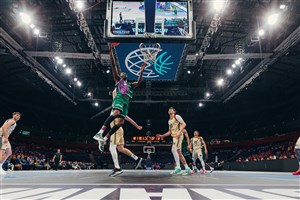
Traore as we know
SHEFFIELD (Julio Chitunda's African Message) - Senegal forward Astou Traore has become an African basketball icon, and the world seems to embrace her.
Even though the 33-year-old has never won an AfroBasket Women trophy with her national team - the most successful with 11 African titles - Traore remains as eager for success as we all know, and her individual accolades put her among the top performers on the African continent.
And because of her extensive experience of European and South American basketball, next time I meet Traore I am going to ask her about the secret for gaining a lot of international notability.
Don't get me wrong, Traore is a great athlete and her professional record speaks for itself.
But until I meet her, I am supposing that her worldwide acclamation comes from her tireless determination and desire to win, just the way she showed at AfroBasket Women 2013 with her tournament-high 16.6 points per game.
Although Senegal were denied a place in the 2014 FIBA World Championship for Women, after finishing third in the African flagship tournament, Traore's nomination for the All-Tournament Team - along with Nacissela Mauricio of Angola, Ramses Lonlack of Cameroon and Mozambique's duo of Leia Dongue and Deolinda Ngulela - convinces me that Africa acknowledges her potential, and the rest of the world receives her with open arms.
Let me rewind a little bit and explain what I mean by international acclamation.
After a successful career in Spain's Liga Femenina de Baloncesto, Traore returned to France last summer to join Saint-Amand Hainaut Basket and become the leading scorer in the Ligue Feminine with 19.2 points per game.
Basketball handbooks recommend individual success should translate into team success. My second question for Traore would be how she copes with her leading scorer role comparing to Saint-Amand Hainaut Basket's ninth-place finish in the 14-team France topflight, or how does she respond to accusations of selfishness.
Nevertheless, if you think Traore's consistent scoring record does not deliver success, think again.
Last month, she crossed the Atlantic to help Ecuadorian club UTE, the hosts of the 2014 SUDCLUBS - South American Clubs Women's Club Championship - finish third in in Quito, Ecuador.
When UTE needed her, Traore responded accordingly as the host team went on to claim the SUDCLUBS bronze medal.
In the battle for the final podium place, against Argentinean side Deportivo Berazategui, the Senegalese forward, along with Paraguay international Paola Ferrari, was crucial with a game-high 38 points and 13 rebounds.
Eventually, Brazilian side Sport Club do Recife claimed the SUDCLUBS top prize while Colombian outfit La Estancia de Popayan finished runners-up.
The captain of Cameroon women's national team, Amina Njonkou, shone for Bolivian club Universidad Catolica leading the tournament with 13.8 rebounds per game, while Traore received the plaudits for leading all scorers with 29.4 points per game and a bronze medal around her neck.
As I mentioned earlier in this column, Traore is a reference on the African continent, and as her playing career seems numbered - I don't know maybe three more years - I feel there is a significant number of Traores in the making.
I am thinking of young African women with as much potential and desire to succeed as Traore, some of whom prevented her from winning a first AfroBasket Women title last summer, in Maputo, Mozambique.
Dongue - who was named the Angola league MVP over the weekend - along with Lonlack, who had an impressive AfroBasket Women campaign and returned to finish her studies at the University of Memphis, as well as Nigeria's Sarah Ogoke and Nadir Manuel of Angola are incredibly good to follow Traore's footsteps.
I simply can't wait to see if Traore returns for what might be her last shot at glory at AfroBasket Women 2015.
Julio Chitunda
FIBA
FIBA's columnists write on a wide range of topics relating to basketball that are of interest to them. The opinions they express are their own and in no way reflect those of FIBA.
FIBA takes no responsibility and gives no guarantees, warranties or representations, implied or otherwise, for the content or accuracy of the content and opinion expressed in the above article.

















